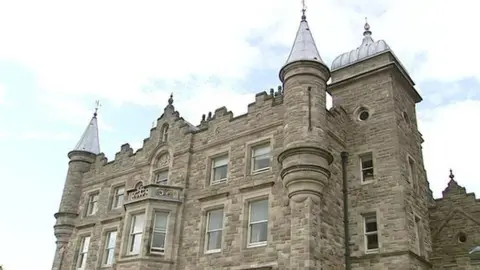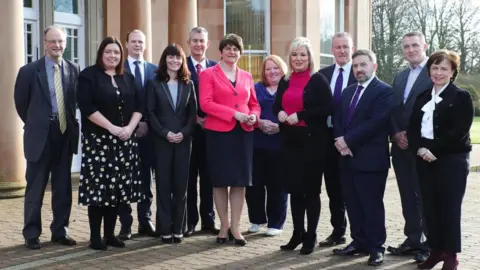Q&A: How does the Northern Ireland Executive work?
 BBC
BBCThe executive is at the heart of Northern Ireland's devolved government, made up of ministers nominated to oversee key departments such as health, finance and justice.
While members of the legislative assembly (MLAs) scrutinise and debate legislation, ministers are in post to make decisions.
BBC News NI looks at some of the executive's key functions and powers:
First, who's in the executive?
The executive is jointly chaired by the first minister and deputy first minister, nominated by the largest and second largest parties in the assembly.
The DUP's Arlene Foster and Sinn Féin's Michelle O'Neill headed up power sharing when the institutions were restored in January 2020.
When Arlene Foster stood down as first minister on 14 June 2021, Sinn Féin's Michelle O'Neill also lost her position as deputy first minister because the roles are a joint office.
Paul Givan was confirmed as Mrs Foster's replacement on 17 June - amid internal revolt within the DUP - while Michelle O'Neill was re-nominated by her party.
Their roles in the Executive Office are supported by two junior ministers.
Seven of the departments that are represented at the executive table are decided by the d'Hondt process.
This calculates how many departments should be assigned to each party according to their size in the assembly, if they choose to be part of the government.
The Department of Justice is an exception, decided on a cross-community basis, with Alliance Party leader Naomi Long the current minister.
Overall, the departments represented are: Agriculture, Environment and Rural Affairs (DAERA), Communities (DfC), Economy (DfE), Education (DE), Finance (DoF), Health (DoH), Infrastructure (DfI) and Justice (DoJ).
What happens when the executive meets?
Traditionally, the executive committee of ministers meets every two weeks.
However, the urgent issues prompted by the coronavirus pandemic in 2020 have led to more frequent sessions, at least once a week, to make decisions on, for instance, lockdown measures.
The committee's main function, as self-described, is to take "decisions on significant issues and matters which cut across the responsibility of two or more ministers".
As a government, ministers are expected to demonstrate collective responsibility, meaning that when a decision is taken by the executive they should stand by it publicly.
This has not always been the case, with occasions where ministers have debated issues openly or stated positions contrary to that which was agreed or passed by the executive.
In July 2020, the ability of ministers to independently take decisions on some key decisions was enhanced with the passage of the Executive Committee Functions Bill.
For example, this allowed Infrastructure Minister Nichola Mallon to recommend approval for the redevelopment of Casement Park stadium in October without needing to seek wider executive approval.
Proponents said this would make the executive more effective, particularly with regard to planning decisions, however, critics have claimed the law could undermine collective responsibility and lead to ministers undertaking "solo runs".
Who decides what?
The agenda of executive committee meetings is agreed by its chairs, the first and deputy first ministers, "taking account of proposals made by Northern Ireland ministers".
Legislation states it is the "duty" of the chairs to try to secure decisions "by consensus wherever possible", however, in the absence of this, a vote will be taken.
In this case, a quorum of at least seven ministers is required.
Three or more ministers can ask for a vote to be taken on a cross-community basis, which effectively gives parties with enough ministers a veto.
There is a procedure for an urgent decision to be made if it is so pressing it cannot wait for discussion at the next executive meeting.
If required, the minister must write to the first and deputy first ministers, and the secretary to the executive, explaining the issue's background and the views of any other affected ministers.
The first and deputy first ministers will then jointly agree a decision on the matter.
 Executive Office
Executive OfficeWhat about the Programme for Government and the Budget?
A task for each new executive is agreeing on a Programme for Government. This document is a commitment by the power-sharing government on a set of policies, plans and targets which ministers can be held to account for.
The current executive says it is "committed to bringing forward an outcomes based Programme for Government that is focused on achieving outcomes of societal wellbeing and delivers real and positive change in people's lives".
In New Decade, New Approach, the parties agreed there would be a multi-year Programme for Government "underpinned by a multi-year budget and legislative programme".
Another important document for the executive to agree on is the budget.
The 2021/22 budget was presented by Finance Minister Conor Murphy to the assembly on 1 April.
The announcement was dominated by spending associated with the then-emerging coronavirus pandemic, however, it demonstrated an agreement by the executive on issues such as a cut to business rates and a freeze for domestic rates.
What is the ministerial code?
All ministers, including junior ministers, are bound by the ministerial code.
It sets out the requirement for ministers to observe the highest standards in the "stewardship of public funds", to be accountable and ensure "that departments and their staff conduct their dealings with the public in an open and responsible way".
Ministers must also make a pledge of office, which centres around a commitment "to discharge in good faith all the duties of office".
The pledge binds ministers to "serve all the people of Northern Ireland equally" and "to promote the interests of the whole community represented in the Northern Ireland Assembly towards the goal of a shared future".
